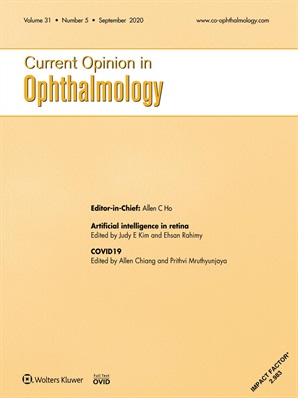In this article for the journal Current Opinion in Ophthalmology, Dr. Wang and her co-authors discuss the evolution of big data and artificial intelligence technologies in medicine, and describe some of the problems that must be addressed for big data to successfully enable the next generation of artificial intelligence.
Big data research has benefitted from important technological advances in recent years. Artificial intelligence research depends on large amounts of data, often collected from multiple institutions, in order to be most effective. More powerful computing resources, implementation of electronic health records, improved data collection, and efforts to create standards for data exchange have all helped researchers aggregate larger datasets. But there are still some important limitations to accessing big data for this kind of research, which the authors discuss in detail.

The authors make several recommendations for improving access to and sharing of big data. First, the authors describe some approaches that would facilitate data sharing and improve interoperability, while also addressing the topic of data privacy. When data cannot be shared due to privacy concerns, it is often possible to share code so that models can be reproduced in other settings while protecting private data. Standardization of application program interfaces (APIs) is needed to facilitate access to artificial intelligence models across different sites. The authors note: "As with data sharing, the challenge in model sharing is to continue to support academic innovation by promoting openness, interoperability, and standardized APIs, thereby accruing the widest possible benefits of artificial intelligence and preventing artificial intelligence models from becoming ‘locked down’ into separate inaccessible silos as we have seen with electronic health records."
This field is evolving rapidly, and the authors emphasize that researchers, academic institutions, healthcare companies, and regulatory agencies need to respond by working together to promote data label standards, data sharing, standards for sharing artificial intelligence model architecture, and accessible code and APIs. These steps will help to enable reproducible science, continue open innovation, and support the use artificial intelligence in clinical settings.
Wang, Sophia Y, Pershing, Suzann, Lee, Aaron Y, on behalf of the AAO Taskforce on AI and AAO Medical Information Technology Committee. Big data requirements for artificial intelligence. Current Opinion in Ophthalmology: September 2020 - Volume 31 - Issue 5 - p 318-323 doi: 10.1097/ICU.0000000000000676

